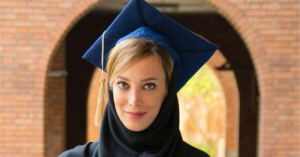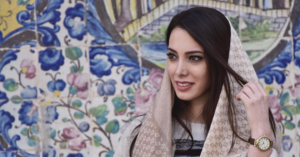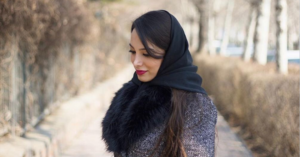Ghazal Nourian
Ghazal, Our Unfinished Poet
My Dear Ghazal!
You wear a white jacket with embroidered red and pink flowers on its left shoulder. You’ve hidden your hands behind your head. You smile and I am the photographer, also smiling. A singular picture takes shape, tears run slowly down my cheeks and I come to speak of my little sister, my own small, little sister. My mouth is salty with tears. I am wounded. Don’t you worry! I will be alright. If you see my hand shaking it’s because I miss you. In this dark, I miss you. Nothing brings light to this dark.
I have to write. I have to write of your life and it is hard to write of light and passion. I have to write of Ghazal Noorian. The third and last child of the family, born on November 2, 1993. Named after a type of ancient poetry. They had agreed that if it was a girl, they’d call her Ghazal and if it was a boy, Faraz. Ghazal it was.
Your father soon passed on his love for math to his daughter. He was an engineer who built roads and buildings. But sometimes he would sit by her side and make puzzles instead. He would solve riddles. Ghazal had fallen in love with numbers, with geometrical shapes, and with a stupid rhombus who couldn’t fit itself in a circle.
“Daddy, why can’t a rhombus fit inside a circle?”
“Daddy! How can some planes fly upside down?”
“Daddy! If a missile flying at high speed hits a moving object, how will it change its direction?”
Dear Ghazal!
I have to speak of your father laughing. But how can I speak of your father’s laugh when I miss you both so? But I will. I will write of your father’s laughter. Of how he saw his teenage daughter loving algebra, trigonometry and physics and thinking that one day she’d study at one of the best universities of the country. And he wasn’t wrong. In 2011, you got an offer so study engineering at Sharif University. But your father was no longer around to see this sweet moment; you were fourteen years old when a heart attack took him away from you. You worried for your mother, worried that all trace of happiness would leave the house and family. Your mother, your brother Peyman and sister Saghar (me), did all they could so that the fourteen-year-old Ghazal wouldn’t be sad. The beauty of her face shouldn’t be wrinkled. Her tall, beautiful torso shouldn’t bend.
You got your degree and went in to do a masters degree in the same field, at Tehran University. This wasn’t hard for you. At the same time, you taught math and physics, and your English was so good that you also taught these at some private institutions in Tehran.
Dear Ghazal!
I have to write of how your questions continued. I have to speak of your long list of ambitions. If I don’t write it, who would believe how you left the house? In our house, everybody loved you and everybody knew that you’d also one day leave. You’d go to chase your ambitions, seek out answers. You hadn’t finished your masters degree when you got an offer from Western University in Ontario, Canada. Rhombuses and planes had done their thing. Now all you needed to do was get on one of those planes to see if it could fly upside down.
Dear Ghazal!
I told you to travel. I told you to go see the world. Twice you came to the United States. We went to see New Orleans, Chicago, California, New York. What memories we built together! I told you that you should stay here with me. You had an offer, you could have done it. Everything was working. But no, you wanted to discover Canada. You said you wanted to stay in the moment, live for the moment. You came back from France and your and your mother’s trips continued. You were her travel companion, her friend and confidante. You had a passion for travel and so, who could stop you? I myself had told you that you should go and see the world.
In the year 2019, you’re a PhD student. In the semester holidays, you went to Iran to see your mom. You had missed her, and she already had a place ticket for March 2020. She wanted to spend Iranian new year with you. When you got on the plane, you cried. You were afraid war would break out while your mother was still there. Peyman was there. People were there.
Dear Ghazal!
I think of you. Of your picture by the sea, of your laughing eyes, the eyes that I love. Your charming smile, of the photographer (myself). Will you come back or will you stay? What you are waiting for in these pictures? I waited so long to hear your voice from Toronto’s Pearson Airport. I so wanted to hear that you had made it. You had wished your mother was flying with you. These days, all your mother can say is “I wish I was, I wish I was.” I wanted you to tell me you hadn’t liked the food on the plane or your seat hadn’t been comfortable. I missed your complaints. I wanted you to tell me there were too many kids on the flight and you couldn’t sleep. You never spoke of the blue sky, of the beautiful headwear of the stewardess, of the luxury of Kiev airport which had started celebrating Orthodox Christmas.
Do you remember, your professor told you that you had to be there on January 6 to commence your work and studies? Remember how you said you wanted to stay two more days? Just two more days. Full of moments that you grasped. “Seize the moment.” I can’t stop thinking about those two damn days. Mother can’t. Peyman can’t.
Dear Ghazal!
I thought you’d achieve your ambition to teach at a university. I thought you’d grow to be a patient mother. You called your mother every day, and I thought one day, someone would call you every day to ask you how you are doing. I thought one day you’d be surrounded by your own kids, and tell one of them how stupid rhombuses are. You’d tell the next one that sometimes two plus two is not four. And you’d tell the third how planes sometimes…
You got on that plane, Ghazal. I can see you walking down an endless corridor. Mother, Peyman and I are by your side. You’ve come back. In your white jacket with the red and pink flowers on its left shoulder. You smile. There is nothing left to say. It’s now up to me to speak to a baby that will be born one day, or to a curious woman in a shopping mall who asks about you. I’ll have to explain what happens when a missile hits a moving object. I’m wondering how I should respond to this question.
Writer: Shahrzad Shams
Translator: Arash Azizi
Editor: Hannah Somerville
With the support of iranwire.com









